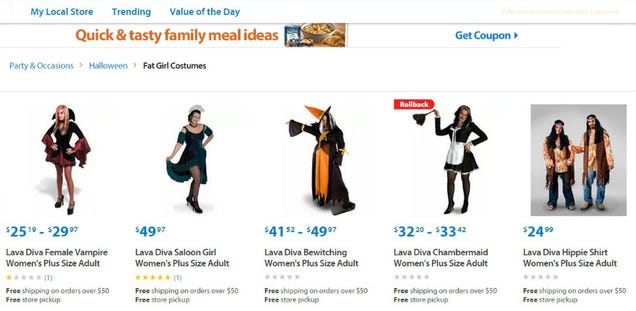Fat Girl Costumes
(photo via Jezebel)
This week, Walmart landed itself in the latest controversy involving bodies and advertising. As Jezebel fist reported, the megastore’s online catalog featured a section of Halloween apparel called, “Fat Girl Costumes.” Jezebel speculated the heading may have been a web developer joke that eluded final editing.
As a joke, this heading is offensive. But, let’s look at the larger picture. To start, I commend Walmart for featuring plus-size costumes. Not every retailer offers size-inclusive styles. And the offensive nature of the language itself is only a product of the relative value of fat versus thin in our current cultural climate. The fat acceptance movement, as evidenced by its name, has worked long and hard to reclaim the word “fat,” from something offensive to a simple description of body size. If fat weren’t such a bad thing, this section of Halloween costumes wouldn’t have created such a stir – like clothing for tall women or petite women, we’d just file it away under offerings that cater to the natural diversity of body sizes. But because fat is such a dagger, this title becomes offensive.
So, rather than focusing on some retailer’s joke or error, let’s celebrate companies that offer plus-size fashions and let’s continue to evolve our dialogue so that the use of the word “fat” doesn’t fall prey to jokes or mistakes and, when used in earnest, is just a descriptor, not a headline.
You can find Does Every Woman Have an Eating Disorder? Challenging Our Nation’s Fixation with Food and Weight on Amazon (as a paperback and Kindle) and at BarnesandNoble.com.
Click on a state below to find eating disorder treatment options that could be right for you.

 Eating Disorder Self Test. Take the EAT-26 self test to see if you might have eating disorder symptoms that might require professional evaluation. All answers are confidential.
Eating Disorder Self Test. Take the EAT-26 self test to see if you might have eating disorder symptoms that might require professional evaluation. All answers are confidential.